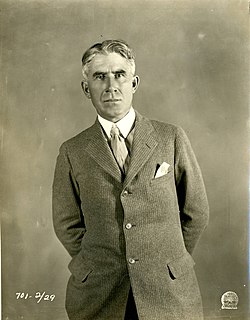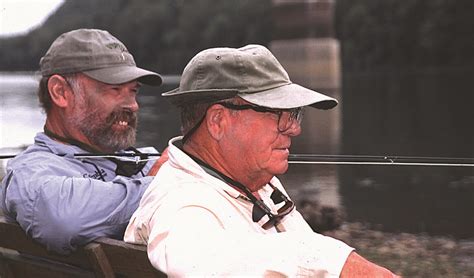A Quote by Zane Grey
There was never an angler who lived but that there was a fish capable of taking the conceit out of him.
Related Quotes
Allowing the fly to sink to the fish's level, the angler makes a retrieve. The fly comes directly at the fish, which suddenly sees its approach. As the small fly get nearer, the fish moves forward to strike, but the tiny fly doesn't flee at the sight of the predator. Instead it continues to come directly toward the fish. Suddenly the fish realizes intuitively that something is wrong(its never happened before), so it flees until it can assess the situation. An opportunity for the angler has been lost.
Catching fish is not a mental game between fish and angler. A 'smart' trout is only smarter than other trout, not smarter than a fisherman. An angler must take the puzzle of the day's conditions, and matching those conditions and his knowledge of the fish come up with a good catch. He competes with a concept, not with a fish's brain.
Anglers have a way of romanticizing their battles with fish and of forgetting that the fish has a hook in his mouth, his gullet, or his belly and that his gameness is really an extreme of panic in which he runs, leaps, and pulls to get away until he dies. It would seem to be enough advantage to the angler that the fish has the hook in his mouth rather than the angler.
If I pull in a fish I have no intention of eating, I release him immediately or give it away. If he's swallowed the hook and you know the fish is going to die, rather than leave him to the sharks you should bring him in for the vitamin content. Aquariums welcome fish for feeding the dolphins and whales.
The traveler fancies he has seen the country. So he has, the outside of it at least; but the angler only sees the inside. The angler only is brought close, face to face with the flower and bird and insect life of the rich riverbanks, the only part of the landscape where the hand of man has never interfered.
The process could be likened to relaxing on a riverbank and watching a fish leap out of the water, sparkle for a moment in the sunlight, then dive back in a graceful arc. There is no need to engage in a mental dialogue about the merits and demerits of the fish, emotionally react to the fish, or jump into the water to try to catch the fish. Once the fish is out of sight, it should also be out of mind.
If a fish is born in your aquarium and you call him John, write out a birth certificate, tell him about his family history, and in two minutes he gets eaten by another fish - that's tragic. But it's only tragic because you projected a separate self where there was none. You got hold of a fraction of dynamic process, a molecular dance, and a separate entity out of it.



































